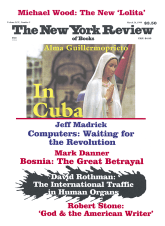In response to:
Instead of NATO from the January 15, 1998 issue
To the Editors:
While I disagree with both the premises and conclusions of Ronald Steel’s argument against NATO expansion [“Instead of NATO,” NYR, January 15], it is his fundamental misunderstanding of NATO’s potential new members-Poland, the Czech Republic, and Hungary-that I wish to raise here.
Steel suggests repeatedly that these new (or renewed) Central European democracies are unsuited for membership in the Atlantic alliance because they are allegedly seething with ethnic hatreds and repressed territorial claims against their neighbors: letting them into NATO would presumably suck the US in to “protect them should they get into a fight with their neighbors.” An expanded NATO would be dangerous should it expand to include “regimes, and ethnic groups, that hate each other and want to expand their borders…. Expansion will not bring tranquillity to countries that have unstable, unrepresentative, or demagogic governments.”
What in the world is Steel talking about? Poland, the Czech Republic, and Hungary are real countries with real problems, but have a track record of considerable, in fact dramatic, accomplishment since 1989 in introducing stable democratic systems, functioning and by many measures flourishing market economics, and stable or excellent relations with neighbors. None is unstable, unrepresentative, or “demagogic.” Does Steel really think that Czech President Havel is plotting an attack on Slovakia or Austria? Poland, the country with which I have the most experience, has no border claim with any neighbor; no Polish government since 1989, nor any political party in government or opposition, has asserted one. One of Poland’s singular achievements since 1989 has been to build close friendships with neighbors Lithuania and Ukraine, dramatically reversing the tensions of the 1930s. Indeed, Poland is providing modest but valuable assistance to its new friends in the former Communist world, in some cases working directly with the United States. This achievement is much in the American interest.
Steel’s argument might be termed the “Bosnianization” of Central Europe: the baseless projection of the most salient failure in the post-Communist world on the most successful new democracies. Happily, the record of these new democracies since 1989 has been fairly successful. West Europe’s record when NATO was founded in 1949 was scarcely better. Has Steel forgotten “age old” French-German rivalry? Germany’s relations with its neighbors? How stable was Italy when it joined NATO? (The US debated whether Italy should be let into NATO and opponents’ arguments were very close to Steel’s.) NATO membership had a stabilizing effect on Western Europe’s “ethnic rivalries” and the prospect of membership in “the West” has strengthened political moderates and weakened nationalists throughout Central Europe, to US benefit.
I invite Mr. Steel to visit Poland and to meet the people-whom he suggests are seized with “hatred” toward their neighbors.
Daniel Fried
US Ambassador to Poland
US Department of State
Washington, D.C.
Ronald Steel replies:
I regret that Mr. Fried feels that I have cast aspersions on the three governments currently up for membership in an expanded NATO. But I am sure that a more careful reading of my article will persuade him that this is not the case. As I stated, both advocates and opponents of a bigger NATO have valid arguments, and I proceeded to list them. Without singling out any particular governments, I noted that a NATO ultimately expanded all the way east to the Russian border, including former republics of the Soviet Union, might not only cause unnecessary problems with Moscow, but involve all NATO members “in quarrels that were hidden, but not resolved, by the cold war.” For this reason I suggested that a more constructive way to deal with the issue of military borders in a post-cold war Europe was to rethink the meaning of the Atlantic alliance. Specifically I proposed a post-NATO alliance between the United States and a European entity that would “include all the nations of Eastern Europe, not only the three under current consideration.” Perhaps Mr. Fried has a better solution. But if so I hope that he will propose it, rather than quoting out of context in ways that distort my humble efforts to open a much-needed wider debate.
This Issue
March 26, 1998



